|
|
|
Sort Order |
|
|
|
Items / Page
|
|
|
|
|
|
|
| Srl | Item |
| 1 |
ID:
127862
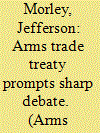

|
|
|
|
|
| Publication |
2013.
|
| Summary/Abstract |
A senior State Department official last month defended the Arms Trade Treaty, signed by the U.S. government in September, after 50 senators wrote to President Barack Obama saying they would oppose the pact. In the Oct. 15 letter, the senators charged that the treaty undermines U.S. credibility, threatens the rights of gun owners, and impinges on U.S. sovereignty. The lawmakers said they "cannot give [their] advice and consent to this treaty" and "do not regard the U.S. as bound to uphold its object and purpose."
|
|
|
|
|
|
|
|
|
|
|
|
|
|
|
|
| 2 |
ID:
174479
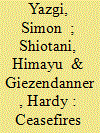

|
|
|
|
|
| Summary/Abstract |
The coronavirus disease COVID-19 has spread at an exponential rate since the World Health Organization declared a global pandemic in March 2020. The United Nations voiced its concerns early about the grave burden that the pandemic placed on people in conflict-affected environments, including its effects on already fragile and vulnerable health care, food security, and other essential services. Recognizing this, UN Secretary-General António Guterres called on March 23 for a global ceasefire to support the response to the pandemic: “To warring parties, I say silence the guns, stop the artillery, end the airstrikes.”
|
|
|
|
|
|
|
|
|
|
|
|
|
|
|
|
| 3 |
ID:
123223
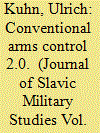

|
|
|
|
|
| Publication |
2013.
|
| Summary/Abstract |
For more than a decade Europe's once unique arms control acquis is in decline. This pertains foremost to conventional arms control. An assessment of current political North Atlantic Treaty Organization (NATO)-Russia problems and military insecurities on the continent shows that a modern approach to conventional arms control could positively contribute to security and stability. In times of financial austerity, a new framework has to focus on mutual military reassurances, transparency, conflict prevention, and the links to nuclear arms control. To achieve such a goal, U.S. leadership, as well as Europeanization of the Reset policy, is needed.
|
|
|
|
|
|
|
|
|
|
|
|
|
|
|
|
| 4 |
ID:
111976


|
|
|
| 5 |
ID:
146718


|
|
|
|
|
| Contents |
For some years now, conventional arms control in Europe has found itself under pressure. The edifice of conventional arms control instruments in Europe consists of three main pillars; the Vienna document on confidence- and security-building measures, most recently updated in 2011; the conventional armed forces in Europe (CFE) treaty, which entered into force in 1992; and the open skies treaty, which entered into force in 2002.
|
|
|
|
|
|
|
|
|
|
|
|
|
|
|
|
| 6 |
ID:
173161
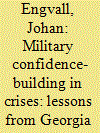

|
|
|
|
|
| Summary/Abstract |
What role can conventional arms control (CAC) and confidence- and security-building measures (CSBMs) play in crises and conflicts? By examining the use of CAC and CSBMs during the Russian-Georgian war in 2008 and during Russia’s annexation of Crimea and the war in eastern Ukraine in 2014, the present article argue that CAC and CSBMs are unable to prevent intentional conflict. Their more realistic value in crises is to function as early warning mechanisms that raise the bar for and increase the costs of conflict as well as serving as instruments to monitor conflicts. To increase their effectiveness, the links between early warning and early action need strengthening and several ambiguities need to be removed, particularly form the Vienna Document, in order to improve indicators, increase warning times and raise the political costs of non-compliance. Nonetheless, when one or two sides seek a conflict, CAC and CSBMs do not provide a remedy for conflict prevention.
|
|
|
|
|
|
|
|
|
|
|
|
|
|
|
|
| 7 |
ID:
129133
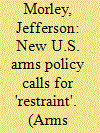

|
|
|
|
|
| Publication |
2014.
|
| Summary/Abstract |
The Obama administration in January announced a new policy on conventional arms transfers that emphasizes the need for restraint in considering transfers that might endanger regional security or human rights. President Barack Obama declared in a Jan. 15 directive that the new policy "supports transfers that meet legitimate security requirements of our allies and partners in support of our national security and foreign policy interests" and "promotes restraint" in those "that may be destabilizing or dangerous to international peace and security." The policy, which replaces a 1995 directive issued by President Bill Clinton, follows the administration's announcement last October that it was loosening rules on the sale of U.S.-made weapons overseas. The reforms announced last fall are part of an effort that the administration says will tighten controls on the sale of the most dangerous arms while enhancing commerce in defense material and services that are not threatening.
|
|
|
|
|
|
|
|
|
|
|
|
|
|
|
|
| 8 |
ID:
109098


|
|
|
|
|
| Publication |
2011.
|
| Summary/Abstract |
Since Mikhail Gorbachev's signing of the CFE Treaty in 1990, Moscow has viewed the agreement as a 'cornerstone of European security.' Vladimir Putin's announcement in 2007 that Russia would 'suspend' implementation of the treaty appeared to signal a paradigm shift in Moscow's approach to conventional arms control. As the European security landscape changed in ways not always favorable to Russia, the Russians' view of the CFE Treaty evolved from cautious optimism through growing frustration to outright hostility. An examination of Russian official thinking at key points in the life of the treaty-as expressed in official journals and statements by government officials-points to a crisis that nevertheless remains short of a paradigm shift.
|
|
|
|
|
|
|
|
|
|
|
|
|
|
|
|
| 9 |
ID:
160686
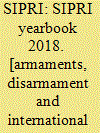

|
|
|
|
|
| Publication |
Oxford, Oxford University Press, 2018.
|
| Description |
xx, 565p.hbk
|
| Standard Number |
9780198821557
|
|
|
|
|
|
|
|
|
|
|
|
Copies: C:1/I:0,R:0,Q:0
Circulation
| Accession# | Call# | Current Location | Status | Policy | Location |
| 059496 | 327.17405/SIP 059496 | Main | On Shelf | General | |
|
|
|
|
| 10 |
ID:
168292
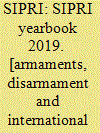

|
|
|
|
|
| Publication |
Oxford, Oxford University Press, 2019.
|
| Description |
xxiii, 672p.hbk
|
| Standard Number |
9780198839996
|
|
|
|
|
|
|
|
|
|
|
|
Copies: C:1/I:0,R:0,Q:0
Circulation
| Accession# | Call# | Current Location | Status | Policy | Location |
| 059730 | 327.17405/SIP 059730 | Main | On Shelf | General | |
|
|
|
|
|
|
|
|
|